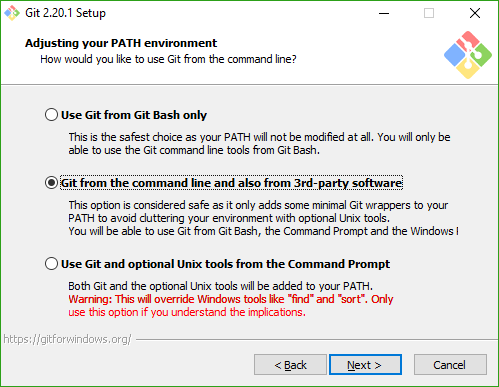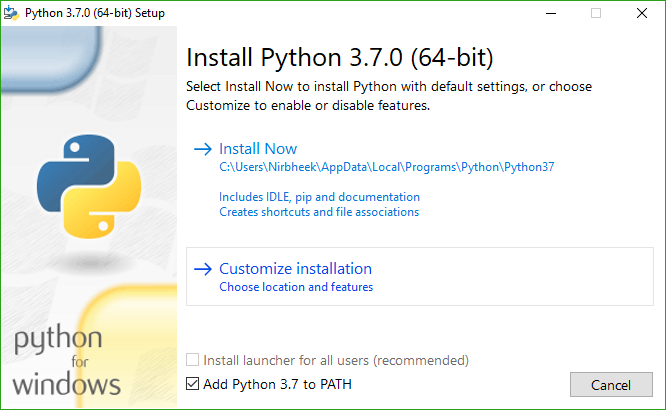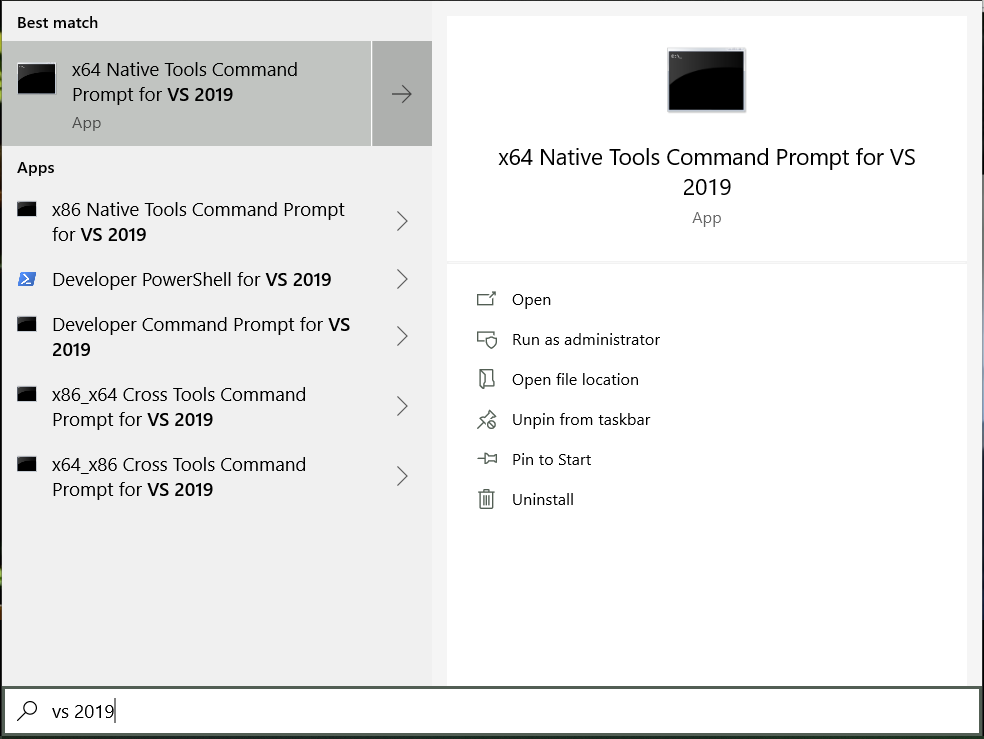| data | ||
| scripts | ||
| subprojects | ||
| tests | ||
| .gitignore | ||
| .gitlab-ci.yml | ||
| .gitmodules | ||
| cmd_or_ps.ps1 | ||
| git-update | ||
| gst-env.py | ||
| gst-uninstalled.py | ||
| gst-worktree.py | ||
| gstreamer-full-default.map | ||
| LICENSE | ||
| meson.build | ||
| meson_options.txt | ||
| README.md | ||
gst-build
GStreamer meson based repositories aggregrator.
Check out this module and run meson on it, and it will git clone the other GStreamer modules as meson subprojects and build everything in one go. Once that is done you can switch into an development environment which allows you to easily develop and test the latest version of GStreamer without the need to install anything or touch an existing GStreamer system installation.
Getting started
Install git and python 3.5+
If you're on Linux, you probably already have these. On macOS, you can use the official Python installer.
You can find instructions for Windows below.
Install meson and ninja
Meson 0.52 or newer is required.
For cross-compilation Meson 0.54 or newer is required.
On Linux and macOS you can get meson through your package manager or using:
$ pip3 install --user meson
This will install meson into ~/.local/bin which may or may not be included
automatically in your PATH by default.
You should get ninja using your package manager or download the official
release and put the ninja
binary in your PATH.
You can find instructions for Windows below.
Build GStreamer and its modules
You can get all GStreamer built running:
meson builddir
ninja -C builddir
This will automatically create the build directory and build everything
inside it.
NOTE: On Windows, you must run this from inside the Visual Studio command prompt of the appropriate architecture and version.
External dependencies
All mandatory dependencies of GStreamer are included as meson subprojects: libintl, zlib, libffi, glib. Some optional dependencies are also included as subprojects, such as ffmpeg, x264, json-glib, graphene, openh264, orc, etc.
Mandatory dependencies will be automatically built if meson cannot find them on
your system using pkg-config. The same is true for optional dependencies that
are included as subprojects. You can find a full list by looking at the
subprojects directory.
Plugins that need optional dependencies that aren't included can only be built if they are provided by the system. Instructions on how to build some common ones such as Qt5/QML are listed below. If you do not know how to provide an optional dependency needed by a plugin, you should use Cerbero which handles this for you automatically.
Plugins will be automatically enabled if possible, but you can ensure that a particular plugin (especially if it has external dependencies) is built by enabling the gstreamer repository that ships it and the plugin inside it. For example, to enable the Qt5 plugin in the gst-plugins-good repository, you need to run meson as follows:
meson -Dgood=enabled -Dgst-plugins-good:qt5=enabled builddir
This will cause Meson to error out if the plugin could not be enabled. You can also flip the default and disable all plugins except those explicitly enabled like so:
meson -Dauto_features=disabled -Dgstreamer:tools=enabled -Dbad=enabled -Dgst-plugins-bad:openh264=enabled
This will disable all optional features and then enable the openh264 plugin
and the tools that ship with the core gstreamer repository: gst-inspect-1.0,
gst-launch-1.0, etc. As usual, you can change these values on a builddir that
has already been setup with meson configure -Doption=value.
Building the Qt5 QML plugin
If qmake is not in PATH and pkgconfig files are not available, you can
point the QMAKE env var to the Qt5 installation of your choosing before
running meson as shown above.
The plugin will be automatically enabled if possible, but you can ensure that
it is built by passing -Dgood=enabled -Dgst-plugins-good:qt5=enabled to meson.
Building the Intel MSDK plugin
On Linux, you need to have development files for libmfx installed. On
Windows, if you have the Intel Media SDK,
it will set the INTELMEDIASDKROOT environment variable, which will be used by
the build files to find libmfx.
The plugin will be automatically enabled if possible, but you can ensure it by
passing -Dbad=enabled -Dgst-plugins-bad:msdk=enabled to meson.
Static build
Since 1.18.0 when doing a static build using --default-library=static, a
shared library gstreamer-full-1.0 will be produced and includes all enabled
GStreamer plugins and libraries. A list of libraries that needs to be exposed in
gstreamer-full-1.0 ABI can be set using gst-full-libraries option. glib-2.0,
gobject-2.0 and gstreamer-1.0 are always included.
meson --default-library=static -Dgst-full-libraries=app,video builddir
GStreamer 1.18 requires applications using gstreamer-full-1.0 to initialize
static plugins by calling gst_init_static_plugins() after gst_init(). That
function is defined in gst/gstinitstaticplugins.h header file.
Since 1.20.0 gst_init_static_plugins() is called automatically by
gst_init() and applications must not call it manually any more. The header
file has been removed from public API.
One can use the gst-full-version-script option to pass a
version script
to the linker. This can be used to control the exact symbols that are exported by
the gstreamer-full library, allowing the linker to garbage collect unused code
and so reduce the total library size. A default script gstreamer-full-default.map
declares only glib/gstreamer symbols as public.
This is an experimental feature, backward uncompatible changes could still be made in the future.
Development environment
Development environment target
gst-build also contains a special devenv target that lets you enter an
development environment where you will be able to work on GStreamer
easily. You can get into that environment running:
ninja -C builddir devenv
If your operating system handles symlinks, built modules source code will be
available at the root of gst-build/ for example GStreamer core will be in
gstreamer/. Otherwise they will be present in subprojects/. You can simply
hack in there and to rebuild you just need to rerun ninja -C builddir.
NOTE: In the development environment, a fully usable prefix is also configured
in gst-build/prefix where you can install any extra dependency/project.
An external script can be run in development environment with:
./gst-env.py external_script.sh
Update git subprojects
We added a special update target to update subprojects (it uses git pull --rebase meaning you should always make sure the branches you work on are
following the right upstream branch, you can set it with git branch --set-upstream-to origin/master if you are working on gst-build master
branch).
Update all GStreamer modules and rebuild:
ninja -C builddir update
Update all GStreamer modules without rebuilding:
ninja -C builddir git-update
Custom subprojects
We also added a meson option, custom_subprojects, that allows the user
to provide a comma-separated list of subprojects that should be built
alongside the default ones.
To use it:
cd subprojects
git clone my_subproject
cd ../build
rm -rf * && meson .. -Dcustom_subprojects=my_subproject
ninja
Run tests
You can easily run the test of all the components:
meson test -C build
To list all available tests:
meson test -C builddir --list
To run all the tests of a specific component:
meson test -C builddir --suite gst-plugins-base
Or to run a specific test file:
meson test -C builddir --suite gstreamer gst_gstbuffer
Run a specific test from a specific test file:
GST_CHECKS=test_subbuffer meson test -C builddir --suite gstreamer gst_gstbuffer
Optional Installation
gst-build has been created primarily for development usage,
but you can also install everything that is built into a predetermined prefix like so:
meson --prefix=/path/to/install/prefix builddir
ninja -C builddir
meson install -C builddir
Note that the installed files have RPATH stripped, so you will need to set
LD_LIBRARY_PATH, DYLD_LIBRARY_PATH, or PATH as appropriate for your
platform for things to work.
Checkout another branch using worktrees
If you need to have several versions of GStreamer coexisting (eg. master and 1.16),
you can use the gst-worktree.py script provided by gst-build. It allows you
to create a new gst-build environment with new checkout of all the GStreamer modules as
git worktrees.
For example to get a fresh checkout of gst-1.16 from a gst-build repository
that is checked out at master, you can run:
./gst-worktree.py add gst-build-1.16 origin/1.16
This will create a new gst-build-1.16 directory pointing to the given branch 1.16
for all the subprojects (gstreamer, gst-plugins-base, etc.)
Add information about GStreamer development environment in your prompt line
Bash prompt
We automatically handle bash and set $PS1 accordingly.
If the automatic $PS1 override is not desired (maybe you have a fancy custom prompt), set the $GST_BUILD_DISABLE_PS1_OVERRIDE environment variable to TRUE and use $GST_ENV when setting the custom prompt, for example with a snippet like the following:
...
if [[ -n "${GST_ENV-}" ]];
then
PS1+="[ ${GST_ENV} ]"
fi
...
Using powerline
In your powerline theme configuration file (by default in
{POWERLINE INSTALLATION DIR}/config_files/themes/shell/default.json)
you should add a new environment segment as follow:
{
"function": "powerline.segments.common.env.environment",
"args": { "variable": "GST_ENV" },
"priority": 50
},
Windows Prerequisites Setup
On Windows, some of the components may require special care.
Git for Windows
Use the Git for Windows installer. It will
install a bash prompt with basic shell utils and up-to-date git binaries.
During installation, when prompted about PATH, you should select the
following option:
Python 3.5+ on Windows
Use the official Python installer.
You must ensure that Python is installed into PATH:
You may also want to customize the installation and install it into
a system-wide location such as C:\PythonXY, but this is not required.
Ninja on Windows
The easiest way to install Ninja on Windows is with pip3, which will download
the compiled binary and place it into the Scripts directory inside your
Python installation:
pip3 install ninja
You can also download the official release
and place it into PATH.
Meson on Windows
IMPORTANT: Do not use the Meson MSI installer since it is experimental and known to not
work with gst-build.
You can use pip3 to install Meson, same as Ninja above:
pip3 install meson
Note that Meson is written entirely in Python, so you can also run it as-is from the git repository if you want to use the latest master branch for some reason.
ARM64 native only: You might need
native upstream ARM64 support fix
which is expected to be a part of Meson 0.55.1.
If your Meson package version which was installed via pip3 is lower than 0.55.1,
then you need to use the latest master branch.
Running Meson on Windows
At present, to build with Visual Studio, you need to run Meson from inside the
VS 2019 command prompt. Press Start, and search for VS 2019, and click on
x64 Native Tools Command Prompt for VS 2019, or a prompt named similar to
that:
ARM64 native only: Since Visual Studio might not install dedicated command
prompt for native ARM64 build, you might need to run vcvarsx86_arm64.bat on CMD.
Please refer to this document
Setup a mingw/wine based development environment on linux
Install wine and mingw
On fedora x64
sudo dnf install mingw64-gcc mingw64-gcc-c++ mingw64-pkg-config mingw64-winpthreads wine
FIXME: Figure out what needs to be installed on other distros
Get meson from git
This simplifies the process and allows us to use the cross files defined in meson itself.
git clone https://github.com/mesonbuild/meson.git
Build and install
BUILDDIR=$PWD/winebuild/
export WINEPREFIX=$BUILDDIR/wine-prefix/ && mkdir -p $WINEPREFIX
# Setting the prefix is mandatory as it is used to setup symlinks during uninstalled development
meson/meson.py $BUILDDIR --cross-file meson/cross/linux-mingw-w64-64bit.txt -Dgst-plugins-bad:vulkan=disabled -Dorc:gtk_doc=disabled --prefix=$BUILDDIR/wininstall/ -Djson-glib:gtk_doc=disabled
meson/meson.py install -C $BUILDDIR/
NOTE: You should use
meson install -C $BUILDDIReach time you make a change instead of the usualninja -C buildas the environment is not uninstalled.
The development environment
You can get into the development environment the usual way:
ninja -C $BUILDDIR/ devenv
Alternatively, if you'd rather not start a shell in your workflow, you can mutate the current environment into a suitable state like so:
gst-env.py --only-environment
This will print output suitable for an sh-compatible eval function,
just like ssh-agent -s.
After setting up binfmt to use wine for windows binaries, you can run GStreamer tools under wine by running:
gst-launch-1.0.exe videotestsrc ! glimagesink


